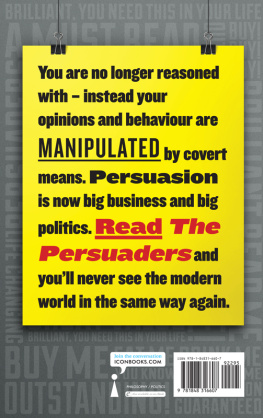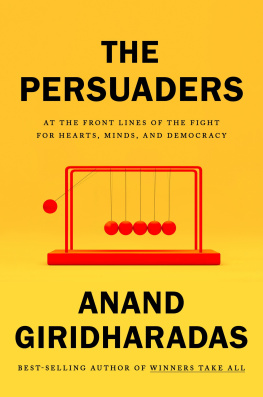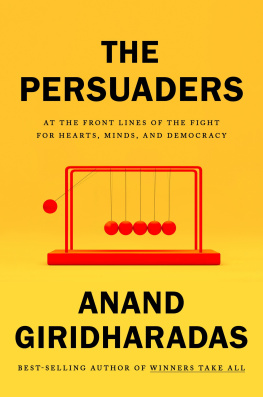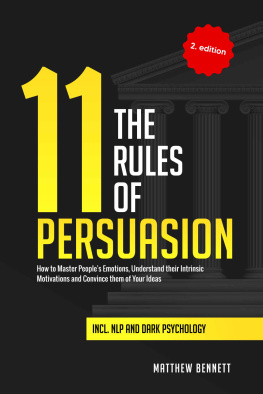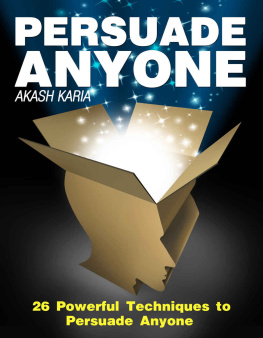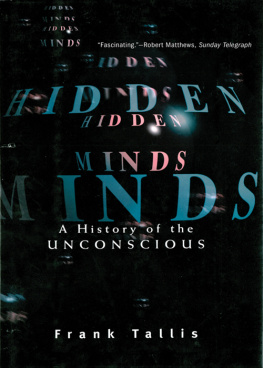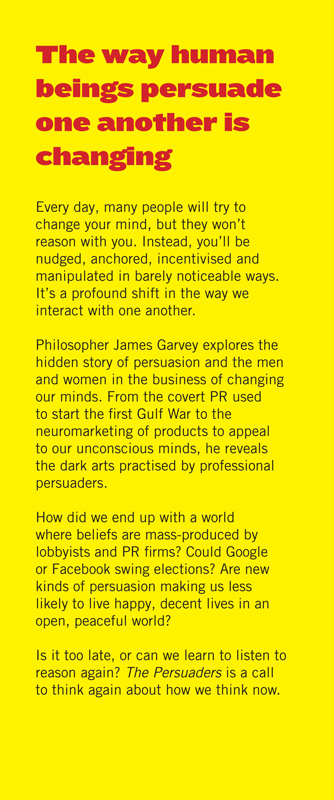
THE
PERSUADERS
Praise for James Garveys The Ethics of Climate Change:
If you dont yet know why you should be morally outraged about the present situation, read this book. Calmly, carefully, with well-marshalled facts and sound argument, Garvey shows us just how badly the nations of the industrialized world and the citizens of those nations are behaving. He also tells us what we need to do about it. Peter Singer, Princeton University
Open this book and James Garvey is right there making real sense to you. A new philosopher doing logic in the world. In a necessary conversation, capturing you to the very end. Ted Honderich, University College London
Essential reading for anyone interested in the urgent moral questions raised by our climate crisis. Mark Lynas, author of Six Degrees: Our Future on a Hotter Planet
Its an excellent book to think with: Garvey has a delicious style, often very funny, and a trick of ushering the reader right inside his thought experiments. Steven Poole, The Guardian
Praise for James Garveys The Twenty Greatest Philosophy Books:
The competition among philosophy popularisers is getting ever more intense by the minute, and the bad news for the rest of the field is that Garvey seems to understand more deeply, write better and explain more clearly than anyone else. Julian Baggini, Times Higher Education
THE
PERSUADERS
THE HIDDEN INDUSTRY THAT WANTS TO
CHANGE YOUR MIND
JAMES GARVEY

Published in the UK in 2016 by
Icon Books Ltd, Omnibus Business Centre,
3941 North Road, London N7 9DP
email:
www.iconbooks.com
Sold in the UK, Europe and Asia
by Faber & Faber Ltd, Bloomsbury House,
7477 Great Russell Street,
London WC1B 3DA or their agents
Distributed in the UK, Europe and Asia
by TBS Ltd, TBS Distribution Centre,
Colchester Road, Frating Green,
Colchester CO7 7DW
Distributed in the USA by
Publishers Group West,
1700 Fourth Street, Berkeley, CA 94710
Distributed in Canada by
Publishers Group Canada,
76 Stafford Street, Unit 300
Toronto, Ontario M6J 2S1
Distributed in Australia and New Zealand
by Allen & Unwin Pty Ltd,
PO Box 8500, 83 Alexander Street,
Crows Nest, NSW 2065
Distributed in South Africa by
Jonathan Ball, Office B4, The District,
41 Sir Lowry Road, Woodstock 7925
Distributed in India by Penguin Books India,
7th Floor, Infinity Tower C, DLF Cyber City,
Gurgaon 122002, Haryana
ISBN: 978-184831-660-7
Text copyright 2016 James Garvey
The author has asserted his moral rights
No part of this book may be reproduced in any form, or by any means, without prior permission in writing from the publisher
Typeset in Minion by Marie Doherty
Printed and bound in the UK by Clays Ltd, St Ives plc
ABOUT THE AUTHOR
James Garvey works for the Royal Institute of Philosophy and edits The Philosophers Magazine. He has written and edited books on the history of ideas, philosophy, ethics, consciousness and social and political thought his books have been translated into ten languages. He also writes for the Guardian, the Times Literary Supplement, the New Statesman and the Times Higher Education. He lives on a canal boat in London.
At the end of reasons comes persuasion.
LUDWIG WITTGENSTEIN
Preface
The moment we want to believe something, we suddenly see all the arguments for it, and become blind to the arguments against it.
GEORGE BERNARD SHAW
B efore I disappear into the footnotes, it might help if I tell you how this started. Five years ago I had the philosophical equivalent of what recovering alcoholics call a moment of clarity. I was in a large, crowded lecture hall in London, listening to a talk given by a high-flying Oxford theologian, and I did something I almost never manage to do. During the question and answer session that followed his talk, I got in an absolutely killer objection. A philosopher behind me swore happily when he heard it. Another sitting next to me smiled, leaned over and whispered, Youve got him! Youve got him in a regress! Indeed I had.
I won the argument that night, plainly, and to come to the point, it made no difference at all. The speaker didnt change his mind. He took more questions and just got on with promoting his view. It occurred to me then that maybe arguments arent actually very persuasive. Even really good ones. Thats what came to me in my moment of clarity.
This thought was to me a big deal. Ive spent a lot of a life picking over arguments, surrounded by philosophers and their books and articles all of us taking arguments very seriously. I thought that arguments are sometimes how you get at the truth and how you persuade others of the truths you have found. A number of people, both inside and outside the academic world, think so too. Thats a large part of what we are all up to in an open society. We present our arguments to one another, sometimes in the public square. We listen, and the side with the strongest reasons is judged right in the end. Those with the best arguments have the assent of all reasonable people, and we move forward together. Weve had the Enlightenment. We might stumble from time to time, but thats how things are supposed to go now.
I began to suspect thats not even remotely how things actually go at all. I dont want to overcook the point and suggest that arguments are entirely unpersuasive but we might well overestimate their hold on us. And Im not simply saying that quite often brawn trumps brains thats nearly too obvious to mention. Im also not being naive, I hope, having only just noticed that human beings are capable of extraordinary irrationality. But I believe there is something newsworthy here, something worrying, over and above all the obvious stuff, something just out of focus, on the corner of our collective vision. Maybe despite how it feels on the inside, good reasons actually have little effect on us, and in fact other forces largely shape what we think. The world we are building together, the lives we are living, the hopes we have and the actions we take its all very much what it is because of something other than good reasons. That possibility menaces me more than a little.
Was the giving of reasons a waste of time? Was I ever really persuaded by an argument or did I just have thoughts and find good reasons for them afterwards? I did have the experience of hearing an argument in favour of something I didnt believe, and although I couldnt find fault in it, I nevertheless didnt buy it for a second. I thought there must be something wrong with it that I just hadnt spotted yet. I began to worry, a lot, about the real role of argument in an actual human life. All of this wasnt exactly life-changing, but if I wasnt careful I thought I might be in some danger of losing my faith in rationality. I could at least feel it slipping. It was like my worldview had tilted slightly, and now nothing looked quite right.
It did not help as I slouched onto a bus on my way home from that lecture that I found myself thinking of the Marx Brothers film Horse Feathers. Theres a musical bit with Groucho playing a professor, cheerfully singing, Your proposition may be good, but lets have one thing understood. Whatever it is, Im against it. That was the soundtrack in my head that night. And even when youve changed it or condensed it, Im against it. I recall feeling slightly ill.
Next page
